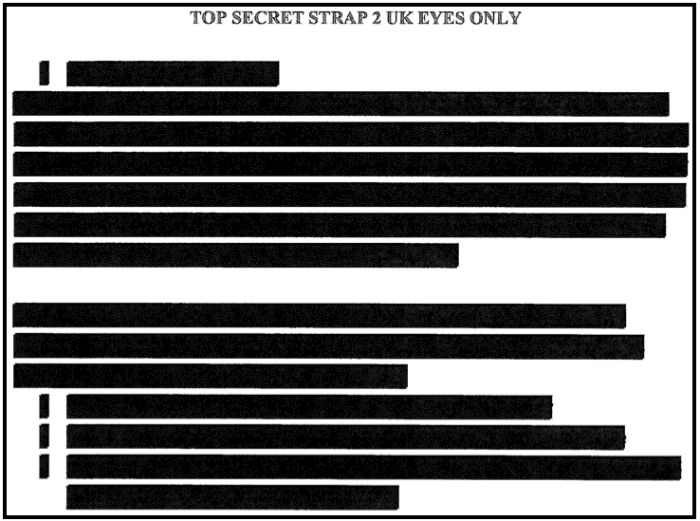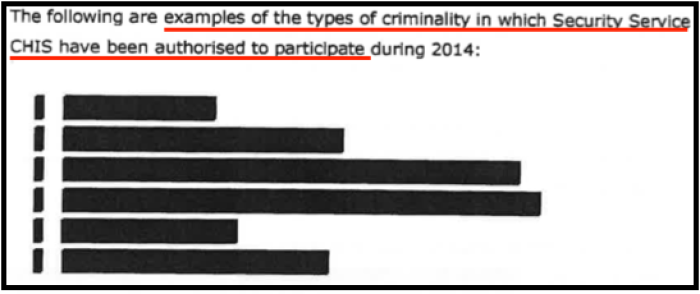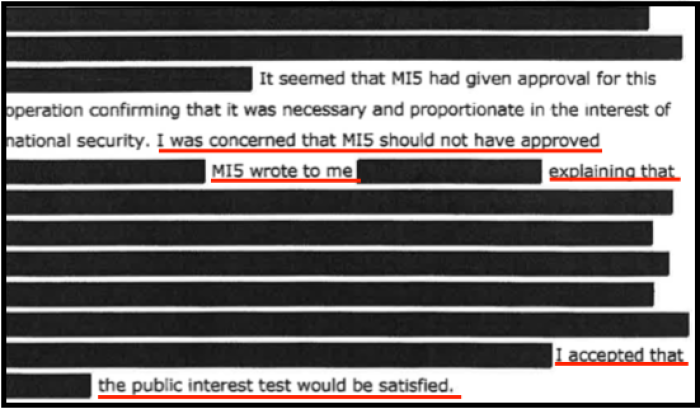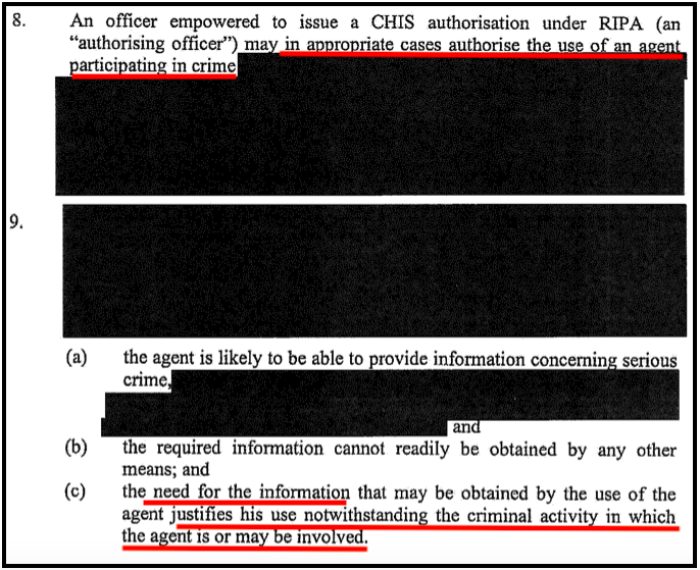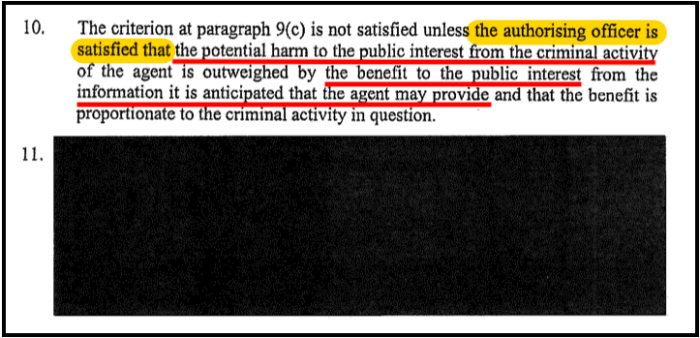A secret MI5 policy that enables crime in the UK with no accountability: How safe would you feel?

*Photo by Kristina Flour on Unsplash
The British government needs to provide assurances that MI5’s secret policy does not authorise people to commit serious human rights violations or cover up of such crimes
Privacy International, along Reprieve, the Committee on the Administration of Justice, and the Pat Finucane Centre, is challenging the secret policy of MI5 to authorise or enable its so called “agents” (not MI5 officials) to commit crimes here in the UK.
So far we have discovered and successfully forced the government to publicly admit the existence of the secret policy, but there are many questions that remain unanswered. This policy violates peoples’ fundamental rights and circumvents the criminal laws of this country, as made by Parliament.
The existence of the policy was inadvertently disclosed during legal proceedings before the Investigatory Powers Tribunal (Privacy International v Secretary of State for Foreign and Commonwealth Affairs). Specifically, in the course of those proceedings, the Government mistakenly disclosed the fact that the Prime Minister had made three directions requiring oversight of the Agencies’ activities. Two of those directions were in the public domain, but the third was secret and had never been disclosed (the “Third Direction”).
At that stage, while the existence of the Third Direction had been (mistakenly) disclosed, its subject and even its name were still secret. As a result of the Government’s resistance to provide any further information regarding the policy, we brought a separate legal challenge seeking further disclosure of the Third Direction.
Faced with the prospect of defending those proceedings, the Government eventually disclosed the Third Direction. Since then, it has been clear to us that the Government are purporting to authorise their agents to participate in crime.
We are continuing to challenge the policy in the Courts. Specifically, we are seeking:
- to demonstrate the unaccountable, undemocratic nature of this secret policy;
- a declaration that the secret guidelines that MI5 relies on to authorise the people it recruits as “agents” to commit crimes are unlawful; and
- to ensure that no violations to the rights of people of the United Kingdom are committed, particularly violations to the rights to life, freedom from torture, and liberty and security.
What is the problem?
Until 2012 both the Third Direction, entitled “Investigatory Powers Commissioner (Additional Directed Oversight Functions) (Security Services agent participation criminality) Direction 2017” and the MI5 policy called “Security Services agent participation in criminality” were entirely secret and subject to no oversight at all. The mere existence of the direction was revealed in 2017, but its content was published on 1 March 2018. Until then the government had never acknowledged that there was a policy to guide MI5 and their “agent handlers” in authorising “agents” to commit crimes. After 1 March 2018, the government also disclosed the MI5 secret policy that was so heavily redacted that there remain many things we do not know.
*Extract from Intelligence Services Commissioner Annual Report Confidential Annex OPEN Version 2014
The government refuses to disclose any meaningful limits to what types of crimes MI5 can authorise “agents” to commit. On the contrary, during the hearing in November 2019, the government implied that there is no need for informants to have any limits as they are not officially part of MI5. Furthermore, MI5 makes no attempt to inform police or prosecutors about these authorisations, which prevents prosecutors from being sufficiently informed to perform their duties appropriately.
MI5 is supposed to be “a publicly accountable civilian intelligence organisation, not a law enforcement agency,” which means that MI5 is not supposed to be able to act in secret to take the law into their own hands, or ignore it. The public has the right to know what type of human rights violations MI5’s policy authorises in the UK. Understanding what MI5 can authorise with respect to terrorist activities in Northern Ireland and extrajudicial rendition remains in the public interest.
What have we learned so far?
As a result of our legal challenge, we’ve successfully forced the government to publicly admit the content of the direction first and the existence of the policy after, and to turn over a number of documents. Here’s some of what we’ve managed to learn so far, using these documents, statements the government has made, and records in the public domain.
1. MI5 secretly authorises “agents” to commit crimes
MI5 recruits people to act as informants and authorises them not only to provide intelligence, but also to commit crimes throughout the UK. The government refers to these informants as “Covert Human Intelligence Sources (CHIS)” or “agents,” but according to MI5’s website, “[a]gents are not MI5 employees.”
According to MI5, “[a]gent operations are run by specially trained officers known as “agent handlers,” and can continue for long periods, sometimes for many years.” Unlike the “agents,” “agent handlers” are MI5 staff. In running agent operations, MI5 “agent handlers” purports to authorise its “agents” to commit crimes: in the government’s words, agent handlers are agreeing to agents’ participation in crime.
Through the limited information that the redacted disclosures of the “Guidelines on the use of Agents who participate in Criminality (Official Guidance)”, we discovered that the Guidelines provide that “No member of the Service shall encourage, counsel or procure the commission by an agent of a criminal offence, save and to the extent that the offence is covered by an authorisation issued under these Guidelines.”
*Extract from Guidelines on the Use of Agents who participate in Criminality (Official Guidance) - March 2011
In reading this sentence in the negative, we can infer that MI5 can encourage, counsel, or procure the commission by an agent of a criminal offense as long as there is an authorisation under MI5’s secret policy to do so. As we discuss below, the policy does not provide any protection to people against any acts committed beyond those authorised. There is no oversight over those crimes.
2. Peoples’ fundamental rights are at stake
Peoples’ fundamental rights, particularly the rights to life, freedom from torture, and to liberty and security are at risk. A secret MI5 policy that authorises people to commit any crimes and subsequent cover-ups of those crimes, would violate those rights. From what we gathered so far and what the government said in Court, it appears that MI5 thinks that this policy may be used to authorise or cover up serious criminal offences. Government documents discuss the types of criminality that MI5 has authorised “agents” to participate in, but the government has refused to disclose those documents. Nor has it confirmed that it does not purport to authorise agent participation in the most serious forms of criminality, including inhumane or degrading treatment. During the November 2019 hearing, it implied the opposite.
*Extract from Intelligence Services Commissioner Annual Report Confidential Annex OPEN Version 2014
3. The MI5 policy has applied since the early 1990s, but earlier versions existed since at least the 1960s
It has been extremely difficult to uncover when the policy was first made or how long it has been in operation. The current Direction came into force on 1st September 2017. It has become clear from the proceedings that the direction replaced an earlier materially identical direction that was made in 2014.
During the course of these proceedings, it became clear that the present MI5 policy on agent participating in criminality has been in place at least since the early 1990s and there are indicators that earlier versions existed since at least the 1960s. According to the Pat Finucane Review, since 1969 there had been internal instructions that “contemplated the possibility that agents . . . could be involved in criminal activity.”
The Report of the Patrick Finucane Review found that a key theme that allowed “an event such as the murder of Patrick Finucane” was “the lack of any adequate framework or guidance for the handling of agents in Northern Ireland” in the late 1980s. Ultimately, the absence of clear policy direction regarding agent-handling had significant consequences.
4. MI5 is dispensing with the criminal laws made by Parliament and usurping the role of prosecutors
The current policy undermines the existing constitutional settlement. There is no law made by Parliament that allows MI5 on its own initiative to authorise “agents” to commit crimes. Nothing in the Security Services Act 1989 provides the express permission needed for MI5 to authorise and conceal crimes. The “Agent Running and Participation n Criminality (Official Guidance)” themselves acknowledge that the Regulation of the Investigatory Powers Act (RIPA) 2000 does “not provide an authorisation process to cover criminal offences committed by agents or their handlers.”
*Extract from "Agent Running and Participation in Criminality (Official Guidance) - Chapter 5 of the Legal Compliance Manual" March 2011
The procedure for MI5 to authorise “agents” or CHIS to commit crimes was created by MI5 itself. The “Security Service Guidelines on the use of Agents who Participate in Criminality” concedes that the covert human intelligence sources code of practice does not immunise agents from prosecution; instead, it amounts to an attempt by MI5 itself to establish “its own procedure for authorising the use of agents participating in crime”.
*Extract from Guidelines on the Use of Agents who participate in Criminality (Official Guidance) - March 2011
MI5’s secret policy is inconsistent with the statutory and constitutional arrangements governing the reporting, detection, investigation and prosecution of crime. The Security Service has no power to dispense with the criminal law and in some circumstances - particularly in Northern Ireland - its officers are statutorily obliged report violations of criminal law to the police.
However, the national prosecution authorities were not told of the policy for decades. The Crown Prosecution Service of England and Wales were apparently provided a copy of the policy only in September 2012, but the government refuses to clarify when the Public Prosecution Service of Northern Ireland and Crown Office and Procurator Fiscal (COPFS) of Scotland were informed. We infer that they have only been told at some point after September 2012.
In documents that we’ve obtained as a result of this legal challenge, we’ve seen that, as recently as 2015, the Investigatory Powers Commissioner suggested that the Crown Prosecution Service should be consulted but was told that “this did not happen at present.” We have not seen any documents to suggest that this has changed since then
*Extract from Intelligence Services Commissioner Inspection Report 1 - June 2015
5. There has never been effective oversight of MI5 authorising agents to commit crimes
Before 2012, there was no oversight whatsoever of these guidelines or how MI5 applied them. After 2012, any oversight has been minimal and ineffective. The Investigatory Powers Commissioner (under Regulation of Investigatory Powers Act 2000) was asked by then Prime Minister David Cameron not to comment on “the legality of the policy,” whether any particular case should be referred to the prosecuting authorities”.
*Extract from Prime Minister Letter to Sir Mark Waller - 27 November 2012
The lack of effective oversight is demonstrated by the concerns expressed by the Investigatory Services Commissioner about the operation and application of MI5’s guidelines. For example, in 2014, according to a report by the Investigatory Services Commissioner, MI5 was unable to “identify precisely how many [“Covert Human Intelligence Sources”] authorisations involve participation in criminality.”
*Extract from Intelligence Services Commissioner Annual Report Confidential Annex OPEN Version 2014
This is concerning. The lack of ability to know how many cases involve criminality suggests a lack of oversight against abuse.
In 2015, the Investigatory Services Commissioner expressed concern that “MI5 had given approval for an operation,” despite the Commissioner’s concerns “that MI5 should not have approved [redacted].” It appears that the Commissioner accepted what seems to be a brief written explanation from MI5 that a public interest test would have been met and took no further steps to investigate the matter. An entirely paper review of the ongoing operations is neither sufficient nor appropriate oversight ensuring the protection of people against abuses.
*Extract from Intelligence Services Commissioner Annual Report Confidential Annex OPEN Version 2015
The Investigatory Services Commissioner was replaced by the Investigatory Powers Commissioner in 2017.
6. The secret MI5 policy applies in the whole UK, including Northern Ireland
This secret policy is of great public importance given that it remains active today in all of the UK, including Northern Ireland and Scotland. The devolved regions of the UK have separate and distinct systems of criminal law, which hold a peculiar and protected position under the UK’s constitutional arrangement.
*Extracts from Statement of MI5 Witness 4 - 19 June 2019
By operating a policy that purports to authorise agent participation in crime, without notifying the prosecutors or police responsible for the devolved regions of the UK, the Security Service has failed to recognise, less still respect, the UK’s constitution. That is particularly concerning in respect of Northern Ireland, where agent participation in crime is known to have led to serious injustices. The Report of the Patrick Finucane Review, for example, expressed “significant doubt as to whether Patrick Finucane would have been murdered by the UDA had it not been for the different strands of involvement by the elements of the state.” The case of Pat Finucane is believed to be one example of many.
What don’t we know?
A lot! There are many unanswered questions about MI5’s policy
There are many questions that remain unanswered about the MI5 secret policy. The burden is on the government to answer those questions. To date, the government has failed to make any disclosures that answer these questions and provide the reassurance the public deserves that MI5 and other law enforcement agencies are properly executing their duties.
The Government seek to justify the policy on the basis that they must be able to access information and intelligence. But they have not clarified the circumstances in which the need for information will justify agent participation in crime, or the type of criminal activity that might be authorised. Would murder be considered an appropriate criminal activity?
*Extract from Guidelines on the Use of Agents who participate in Criminality (Official Guidance) - March 2011
What types of “potential harm to the public interest from the criminal activity of the agent” can MI5 permit or enable?
Extract from Guidelines on the Use of Agents who participate in Criminality (Official Guidance) - March 2011
Without assurances from the government that there is an adequate legal basis, with sufficient safeguards and oversight, we cannot know one way or the other whether MI5 is doing its job properly or not. The burden should be on the government to restore public confidence that to the extent that agents participate in serious crimes, such actions must not go unpunished.
